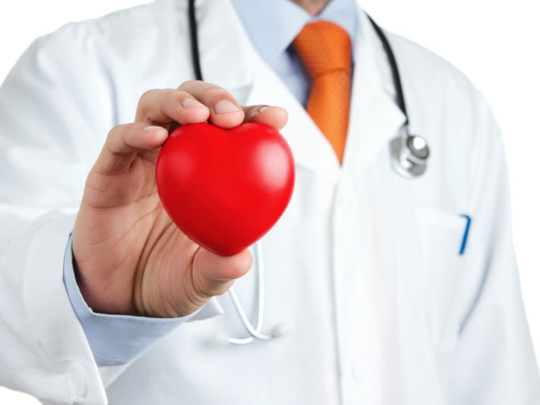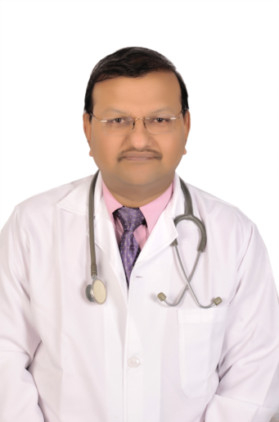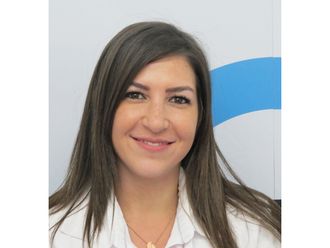
Close your fingers and form a fist. Note its size. That’s how big (or small) I am. Given that you will never get to physically see me, your clenched fist is a good way to know my size inside your body. When I say size, I refer purely to my physical size. I also have a metaphoric dimension whose size depends entirely on you. I can be huge and generous or as small and selfish. But that’s another story.
Let me show where I live
You know when people take an oath, make a promise or swear undying love, they often place their hand on the left side of their chest? It’s I am located in the centre of your chest, slightly to your left. I can be felt on the left side because my left lower chamber (left ventricle) is more powerful of my two ventricles. My beat is typically best felt in the space between your 5th and the 6th rib on the left side, near the nipple.
I lie behind the sternum (your breast bone), in front of the vertebral column (back bone), and between the two lungs in a space called the mediastinum (I am using this big words because you should be conversant with medical terminology, my friend). The mediastinum also houses the oesophagus (food pipe) and the trachea (wind pipe). But then unpredictability is the nature of life so in 1% of the population, I am situated on the right instead of the left. This condition is called Dextrocardia. This may show changes in ECG readings but is otherwise harmless. It may or may not be associated with reversal of positions of other organs of the body - the liver and appendix being on the left side of the abdomen instead of the right, for example. (Situs inversus).
My vital stats (in triple digits!)
I weight about 250-350 gms and am shaped like a pear. My weight may go up to 1,000 gms if I am extremely diseased and hypertrophic (an increase in my size due to extra work over a long period).
I am a hollow muscular organ enveloped by a fibrous sheath called the pericardium. This not only protects me and anchors me securely, it also prevents me from filling up with blood beyond my capacity. The pericardium has 2 layers with a watery fluid in between which reduces friction when I beat, much like the engine oil in your car.
I am made up of muscular and connective tissue arranged in 3 layers - the epicardium (closely associated with the pericardium), the myocardium (the bulk of the muscle) and the endocardium (which is my inner most layer and in perpetual contact with the circulating blood).
I have 4 hollow chambers, 2 above the other 2. The upper ones, atria, are thinner walled as they pump blood to the lower 2 chambers, the ventricles, only.
My workflow: I run a perfect system of input and output so precisely configured, your health is directly dependent on its efficiency. A large vessel arises from me and branches out at intervals to supply fresh blood to all parts of your body. This is the aorta, the output. For input, a pair of large veins - the vena cava - carries blood to me – one from the upper part of your body, including the head and neck, and the other from the lower part including the abdomen and lower limbs. The process of purifying and oxygenating blood is, as it must be obvious to you by now, non-stop.
Input: My right atrium receives blood from the whole body through large veins, the inferior and superior vena cava. It then pumps the blood to the right ventricle through the tricuspid valve.
Output: The right ventricle pumps it to the lungs via the pulmonary artery through the semi lunar valve.
Input: The left atrium receives the now oxygenated blood from the lungs through the pulmonary vein and sends it to the left ventricle through the mitral valve.
Output: The left ventricle sends it spurting to the general circulation through the aorta via the aortic valve.
All my valves allow unidirectional blood flow only. How’s that for unbeatable logic?
Did you know that for me to beat (contract and release, which is what is a heartbeat) I need an electrical impulse? This impulse is generated near the right atrium at what is called the sino atrial node (SA node) and spreads in a closely co-ordinated manner throughout my musculature.
My job description (it outdoes any other man-made job there is, even if I say so)
I am a mechanical wonder, a supremely efficient organ, a fantastic pump.
I was born to beat. That’s my only job. I have been doing this since you were 21 days old in your mama’s womb. By the time you are 70 (and I hope you have as many birthdays as that and more) I would have pumped a million litres of your blood around your body and beaten 3 billion times.
When I am at my best behaviour, I beat about 72 times a minute. Anything more than that and it means you are forcing me to beat to your erratic lifestyle. That’s best avoided, if you ask me.
My wish list (and I am not asking for the moon you understand)
1) Lead an active life. I love it when you are up, about and active. It makes me feel great. Regular exercise revs me up. 30 minutes of light jogging or brisk walking, and I am in great rhythm, and so are you my friend. This also opens up the so-called collateral circulation not only throughout the body but of the coronary arteries themselves, doing much to keep them clean and patent.
Exercise also removes unhealthy components of artery clogging fats from the blood circulation and keeps blood sugar under control.
2) Please stop smoking. I know you feel great when you light up and it’s convivial and all of that but think of me for a moment. All that inhalation, those hundreds of chemicals in cigarettes, the rush of nicotine, all this makes me ill. Even my colleagues, the lungs, are forever complaining but who listens to them?
3) Eat good food, not junk. Fruit, vegetables, whole grains, lean protein, good fats, these are great things that make feel strong and smart. Junk food, saturated fats, excessive salt and sugar are like unwelcome guests. I dread their arrival because they have a very negative effect on me. Also, could you please eat in moderate quantities? When you eat a large meal, I feel heavy and burdened. I have to work twice as hard to do my job. Yeah, I know I said my muscles are indefatigable but cut me some slack, okay?
4) Sleep properly. I appreciate that you work hard and play hard but must you keep awake till late, watching TV or surfing the net and not taking a break as you should? Of course I will beat as usual to keep up with your tired body and mind but getting just 5 or 6 hours of sleep is not something that makes me feel good. How would you feel if your weekend was reduced to one day?
5) Control your stress and emotions. Hey, I can bear an occasional dust-up or a water works session but too much of stress and emotional yo-yoing can really trip up my routine. Yes, I get it that life is all about laughter and tears but someone told me that life is also all about balance
6) Have fun, laugh a lot. I love it when you laugh. It makes me smile. That rumbling, streaking drum roll of laughter that starts below me and roars past me… oh, the exhilaration! I feel terrific. When you get happy, I get happy. It takes a load off me.
7) Have regular check-ups. You must have a check-up even if you are feeling fine and have no history of illness in your family. From your 20s, you ought to have a complete medical checkup every 5 years till the age of 40, and then every 2-3 years. The check-up involves a complete physical examination, lipid studies, tests for diabetes, blood pressure recordings. The doctor may prescribe additional tests specific to melike an ECG, treadmill, echocardiogram, angiogram depending on how he feels he needs to evaluate my performance.
8) The check-ups should be annual or more frequent if you are found to be diabetic, hypertensive, have high cholesterol, have a family history of diseases or history of a sudden unexplained death in the family.
My nemesis (how I wish it never comes to this)
You read my wish list. Now, let’s me tell what happens when it is heartlessly ignored. I won’t fail you suddenly (it’s not my nature to betray you), but the burden of being neglected for long takes its toll on me. I will skip a beat, give you that sinking feeling, desperately hoping that my alarm bells are being heard by you. Like a long-suffering spouse who hangs in there despite her partner’s bad behavior - because there is love involved – I will suffer for you and keep reminding you that there is trouble ahead.
The trouble can be in various ways:
1) Coronary heart disease. My arteries supplying oxygen and nutrients to my muscles are partially blocked due to deposits of fatty debris.
2) Cor pulmonale where my right ventricle is under stress as the pressure in the pulmonary artery increases, as due to lung causes.
3) Cardiomyopathy: My pumping action is severely compromised due to dilatation of the chambers, their hypertrophy (increase in thickness) or restriction in their expansion due to stiffening of the walls.
4) Myocardial infarction or heart attack. In this much-bandied word which unfortunately is a serious condition not to be trivialized in everyday conversations (’Relax buddy, Don’t have a heart attack over it’) a part of my musculature dies due to lack of blood supply, commonly as the coronary artery supplying that part is blocked due to clot or fat.
5) Congestive cardiac failure is my inability to pump as well as I should . It may be acute or chronic, high output or low output, right sided or left sided, compensated or decompensated.
6) Valvular heart disease. This is called so according to my valve and its condition. If my mitral valve is allowing blood to go back from the left ventricle into the left atrium, the condition is called mitral regurgitation.
7) Arrhythmia is an irregularity in my beating rhythm. There are various types of arrhythmia.
8) Rhuematic heart disease. This a damage to my valves as a result of a throat infection caught in childhood.
9) Congenital heart disease is a manufacturing defect in you as a baby. There may be a hole between my 2 atria or the 2 ventricles, the pulmonary artery and vein may communicate or the vessels may arise from the wrong chamber.
10) Angina Pectoris. It’s a condition when you develop chest pain on walking or on exercise, which typically disappears on rest. This is due to the narrowing the coronary arteries due to clots or fatty debris. This reduces their capacity to bring blood to me in situations when I need more oxygen, for example when you are exercising or trekking up a mountain.
Let’s talk about your check-list in your own interests
1) Crushing pain in the centre of your chest or to the left. It may radiate to the left arm, the jaw, the teeth, neck and may typically be associated with vomiting, nausea and sweating.
2) Heartburn, acidity, dyspepsia, fullness of abdomen.
3) Fainting, dizziness, light headedness, weakness, anxiety, choking.
4) Breathlessness or difficulty in breathing, shortness of breath. Sudden appearance of breathlessness when you never have never had a breathing problem.
5) Palpitations: when you become acutely aware of my beat.
6) Sudden collapse.
7) Faster beat, pounding in the chest.
8) Swelling of your body - oedema. It is typically less in the morning (in contrast to oedema due to kidney causes), increases progressively during the day, is painless and more pronounced on the feet and ankles. Pressing on the swelling for 10 seconds will make it disappear, resulting in a localized depression which, however, fills up within 15 minutes. (This is called Pitting oedema).
9) Cough with a white sputum.
10) Weight gain which may be of 1-2 kgs in a single day, due to water retention and oedema.
INVESTIGATIONS I REQUIRE
1) Chest X-ray to see my shape and size and to detect fluid accumulation in your lungs.
2) Blood tests to detect, cardiac enzymes which I release when my muscle is damaged and also for diabetes, lipid disorders.
3) ECG to detect changes in the electrical pattern generated by me.
4) Coronary angiogram to detect changes in the coronary arteries.
5) Echocardiogram.
6) Treadmill (exercise stress test).
7) Holter monitoring (a 24- hour ECG study).
8) CT scan.
9) MRI
10) Nuclear imaging with radio isotopes.
In parting, I would like to say…:
My needs are your needs. At the end of the day we depend on each. As long as I keep beating well, you can be upbeat about enjoying a beautiful life.
(Dr Atul Kumar Mathur is a Abu-Dhabi based surgeon).












